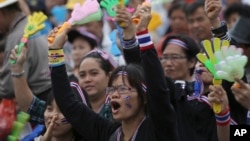BANGKOK —
Thailand's Senate has postponed until Monday a debate on a controversial amnesty bill that has drawn tens of thousands of people to the streets in recent days. The outpouring of opposition to the bill represents the biggest test for the governing Pheu Thai Party since it came to power in 2011.
Tens of thousands of protestors have marched throughout Bangkok ever since a week ago, when the House of Representatives rushed through a vote on the measure to provide amnesty for thousands of people accused of crimes related to political unrest since 2004.
By Friday, after an outpouring of opposition from many sectors of Thai society, the ruling party was calling for an end to the protests because the measure is headed for defeat.
Panitan Wattanayagorn, a political scientist and former government spokesman, says the size of the protests has caught the government off guard.
"The movement against the draft amnesty bill has been more intense than the government expected and in particular the united voice against the bill throughout the provinces and across different sections of society, created the biggest ever challenge to Yingluck's administration since her election," said Panitan.
The government says the bill is a key step in national reconciliation. But the measure also includes amnesty for political leaders; in particular Prime Minister Yingluck's brother, former leader Thaksin Shinawatra, who fled Thailand in 2008 to avoid a two year jail term for corruption.
Protesters in Bangkok have come from across Thai society and even included some grass root supporters of Thaksin, known as the Red Shirts. A Red Shirt leader, Sombat Boon Ngamanong, says many supporters are angry with the governing Pheu Thai Party, even though they may continue to support the party in the short term.
Sombat says Pheu Thai has 'lost face' and supporter faith over the bill, leaving many red shirts to question further support of the Pheu Thai Party at the next general elections, scheduled before 2015.
Pasuk Phongpaichit, a political economist at Chulalongkorn University, says the latest protests mark a maturation of Thailand's democracy, with disparate groups uniting around a common cause.
"It's very positive. A lot of positives will come out of this," said Pasuk. "Already there are the middle class in Bangkok who came out to say that and the fact some of the Red Shirts oppose this terrible amnesty law shows that they can think for themselves and they are not being led by Thaksin and Pheu Thai."
With so many groups out on the streets in Thailand, analyst Panitan Wattanayagorn says some may use the opposition to the amnesty bill as a catalyst to challenge the ruling party even after the bill is withdrawn.
"It seems like the dropping of the draft bill and related drafts in the parliament may not be satisfactory to many of these groups although some of the groups are quite sure that they are just against the bill -- not against the administration," said Panitan.
The Democrat Party-led protests have set a deadline of Monday evening for the bill to be dropped. More protests are expected until then.
Tens of thousands of protestors have marched throughout Bangkok ever since a week ago, when the House of Representatives rushed through a vote on the measure to provide amnesty for thousands of people accused of crimes related to political unrest since 2004.
By Friday, after an outpouring of opposition from many sectors of Thai society, the ruling party was calling for an end to the protests because the measure is headed for defeat.
Panitan Wattanayagorn, a political scientist and former government spokesman, says the size of the protests has caught the government off guard.
"The movement against the draft amnesty bill has been more intense than the government expected and in particular the united voice against the bill throughout the provinces and across different sections of society, created the biggest ever challenge to Yingluck's administration since her election," said Panitan.
The government says the bill is a key step in national reconciliation. But the measure also includes amnesty for political leaders; in particular Prime Minister Yingluck's brother, former leader Thaksin Shinawatra, who fled Thailand in 2008 to avoid a two year jail term for corruption.
Protesters in Bangkok have come from across Thai society and even included some grass root supporters of Thaksin, known as the Red Shirts. A Red Shirt leader, Sombat Boon Ngamanong, says many supporters are angry with the governing Pheu Thai Party, even though they may continue to support the party in the short term.
Sombat says Pheu Thai has 'lost face' and supporter faith over the bill, leaving many red shirts to question further support of the Pheu Thai Party at the next general elections, scheduled before 2015.
Pasuk Phongpaichit, a political economist at Chulalongkorn University, says the latest protests mark a maturation of Thailand's democracy, with disparate groups uniting around a common cause.
"It's very positive. A lot of positives will come out of this," said Pasuk. "Already there are the middle class in Bangkok who came out to say that and the fact some of the Red Shirts oppose this terrible amnesty law shows that they can think for themselves and they are not being led by Thaksin and Pheu Thai."
With so many groups out on the streets in Thailand, analyst Panitan Wattanayagorn says some may use the opposition to the amnesty bill as a catalyst to challenge the ruling party even after the bill is withdrawn.
"It seems like the dropping of the draft bill and related drafts in the parliament may not be satisfactory to many of these groups although some of the groups are quite sure that they are just against the bill -- not against the administration," said Panitan.
The Democrat Party-led protests have set a deadline of Monday evening for the bill to be dropped. More protests are expected until then.




